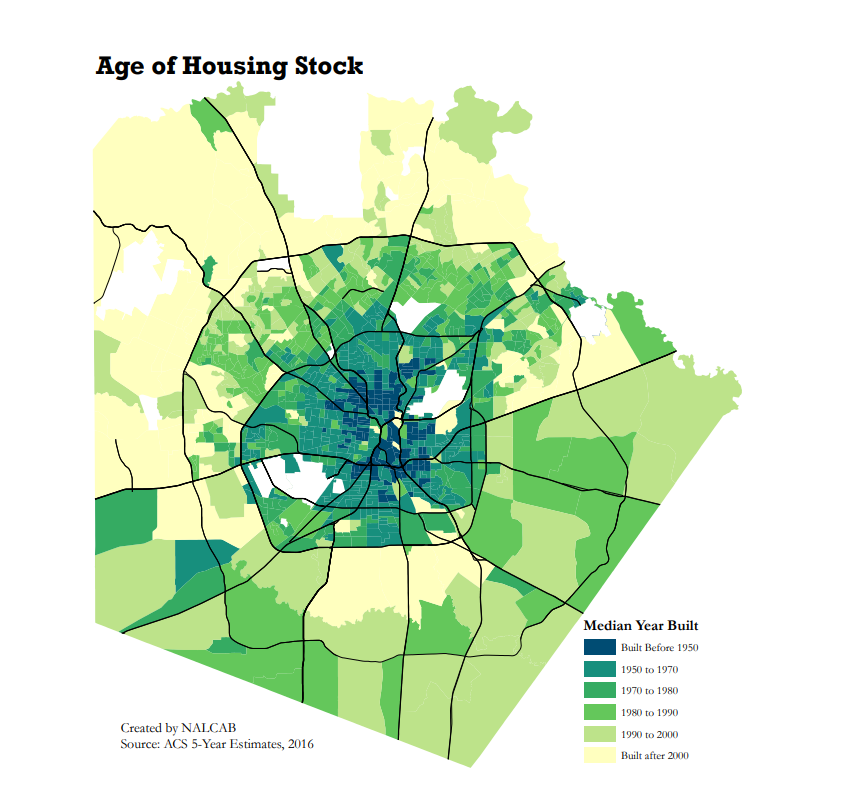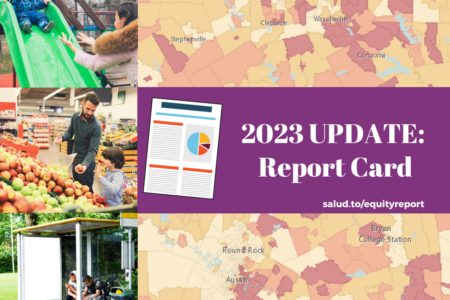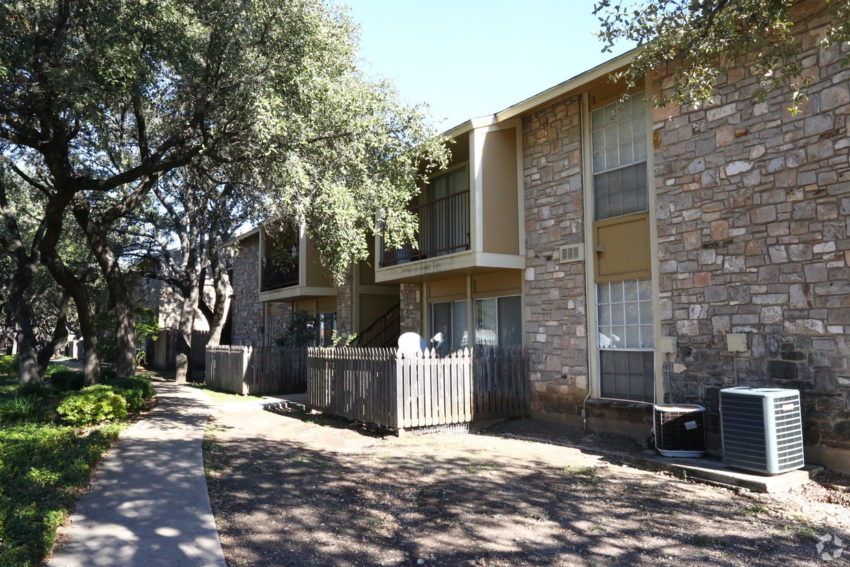
Share On Social!
“Affordable living” is a myth for many people in San Antonio, Texas (63.6% Latino).
More than half of people here don’t make the $18 an hour needed to afford the median apartment rent. Population and job growth outpace housing by 2.3 to 1. Affordable housing is lacking. Evictions nearly doubled between 2013 and 2016.
This threatens economic opportunity and health for many Latino families.
That’s why the Mayor’s Housing Policy Task Force’s new report urges the San Antonio City Council to budget for new housing jobs, triple city spending on affordable housing production and rehabilitation, and even change the city’s charter to create new ways to pay for more affordable housing.
“For us to make a significant impact, it’s going to require a long view and commitment over time,” Lourdes Castro Ramírez, task force chair, told the Rivard Report.
What will the City Council do at its budget vote on Sept. 13, 2018?
The 3-Pronged Housing Crisis in San Antonio
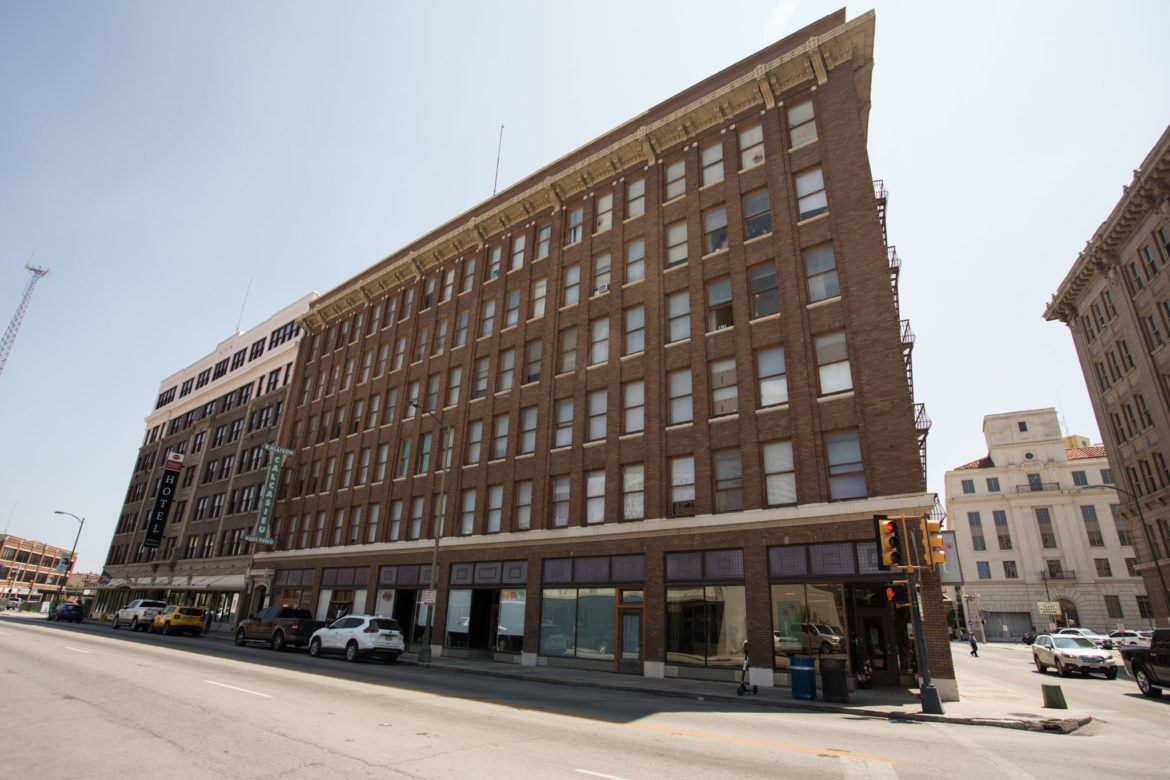
Source: BONNIE ARBITTIER RIVARD REPORT
The key to building health, wealth, and economic mobility is “stable, quality, affordable housing that provides access to employment, educational institutions and health care resources,” according to a January 2018 report by the National Association for Latino Community Asset Builders (NALCAB).-
Three big issues are preventing this kind of situation in San Antonio.
Population and job growth outpace new housing units by 2.3 to 1. The national ratio is 1 to 1, where housing units are keeping up with job growth.
The city anticipates needing 25,000 new housing units per year over the next 20 years to accommodate expected growth. However, since 2005, the city has grown by only 6,600 housing units per year, according to
the Mayor’s Housing Policy Task Force.
“There are currently 27,671 applicants on the waiting list for housing choice vouchers, and 27,327 applicants on the waiting list for public housing,” according to NALCAB.
Housing costs outpace incomes. It takes $18 an hour to afford San Antonio’s median rent for an apartment. But 60% of San Antonio workers make less than $15, according to the task force.
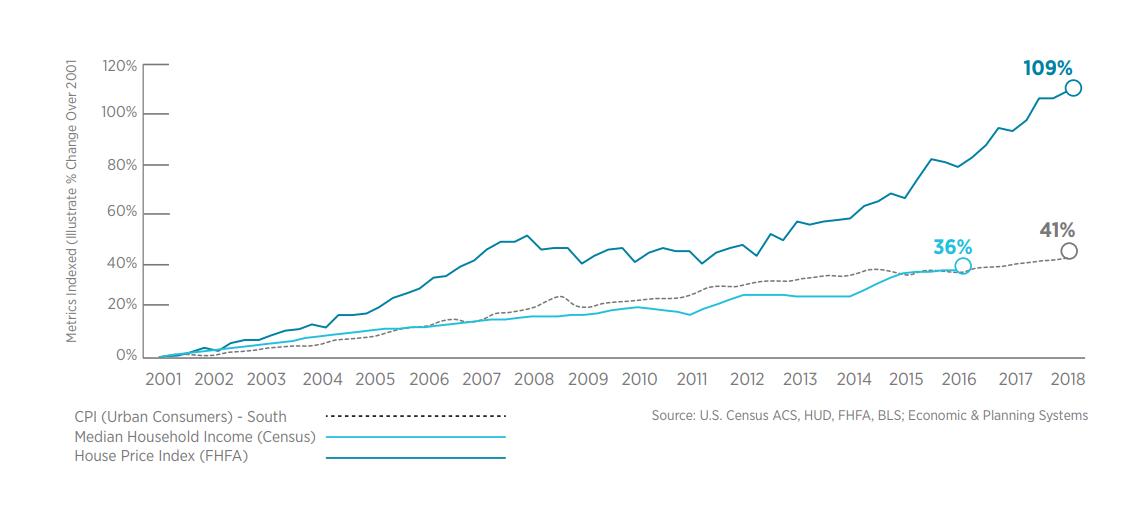 The House Price Index has increased 109% since 2001. Median incomes have only increased by 36%.
The House Price Index has increased 109% since 2001. Median incomes have only increased by 36%.
More than 165,000 of households are housing cost-burdened, meaning they are spending more than 30% of their income on housing, according to the task force report. Of renters in San Antonio, 44.4% are cost burdened.
In the larger metro area, over 100,000 are paying more than 50% of their income on housing costs, according to the NALCAB report.
“Cost burdened households will be sensitive to relatively small changes in housing costs and, in an appreciating real estate market, are vulnerable to affordability-based displacement,” according to NALCAB.
Additionally, eviction rates in San Antonio outpace Texas and the rest of the county. Families facing eviction are saddled with additional costs, like attorney fees and court costs and often lose deposits made when signing the lease. These families are then required to come up with first month’s and last month’s rent and various deposits to secure a new place.
Much of the existing affordable housing stock may be considered vulnerable “because there are factors that could lead to significant price increases or because deteriorating physical condition or geographical location make units unmarketable and/or uninhabitable,” according to NALCAB.
Additionally, displacement increases susceptibility to transportation cost-burden situations.
Many experts agree that combined housing and transportation costs are considered affordable if they do not exceed 45% of household income.
“Residents of mobile home communities located in neighborhoods that are experiencing rapid real estate appreciation will be particularly vulnerable to displacement,” according to NALCAB.
Some households may find similar or cheaper housing far away. But they end up spending more income on transportation and sacrificing access to healthy food, healthcare, and education and employment opportunities.
Viewed through a larger economic development lens, employers and employees depend on affordable housing AND transportation.
San Antonio’s Efforts to Address Affordable Housing
Reducing the San Antonio housing cost burden is one of the community indicators identified by residents in 2010 as part of the SA2020 initiative to track progress toward positive community changes.
In August 2017, the Mayor of San Antonio created the five-member to create “comprehensive and compassionate” housing strategies.
The task force worked with more than 550 community members to develop recommendations.

Source: BONNIE ARBITTIER RIVARD REPORT
They presented their preliminary findings to City Council in June 2018.
They released their final report in August 2018 with recommendations to:
- Immediately create an executive position in the City Manager’s Office to lead housing and neighborhood-related activities and integrate with all city functions.
- Substantially increase general fund revenue for affordable housing.
- Increasing funding for housing rehab programs, including, but not limited to: Owner Occupied Revitalization, Under One Roof and Minor Repair.
- Prioritize funding new rental units in communities that are linked with transportation, jobs and cultural assets.
- Increase service-enriched housing.
- Revise the Unified Development Code (UDC) to remove regulatory barriers to affordable housing.
Many recommendations made their way into the city’s proposed 2019 fiscal year budget, which was presented to Council on Aug. 9, 2018, by City Manager Sheryl Sculley.
For example, the proposed $2.8 billion budget included $25.1 million for affordable housing initiatives and assistance programs, which is $17.1 million more than the previous year.
The proposed budget would create 13 city staff positions in the Neighborhood and Housing Services Department, even though it would not create the executive position in City Manager’s Office, which was recommended by the task force.
“I think we would all agree that it’s critically important to be able to hire an executive with experience and expertise and someone to be held accountable for making sure that these policy recommendations are implemented not just in year one,” Castro Ramírez told the Rivard Report.
Listen to Castro and others discuss the state of affordable housing in San Antonio on Texas Public Radio’s (TPR’s) live call-in program The Source.
UPDATE: On September 6, City Council voted to accept the historic Mayor’s Housing Policy Task Force and approved key recommendations to ensure an adequate supply of affordable housing.
An Even Bigger Future Step
The task force’s final report also included a 10-year funding target to increase city investment in housing by leveraging $3.8 billion in public-private spending.
However, per the city’s charter, direct spending on housing projects is not allowed.
Should the city revise its charter to allow bond revenue to be used for affordable housing, the task force recommends using $250 million in bonds to housing bonds over the next 10 years.
One of the task force’s strategies to increase city investment in housing is to make this revision to the city charter.
City Council will vote on the proposed budget on Sept. 13, 2018.
UPDATE: On September, City Council voted to adopt the $2.8 billion budget for fiscal year 2019, which included $17.1 million in new funding for the implementation of the Mayor’s Housing Policy Taskforce recommendations.
You can advocate for affordable housing in your city. You can contact your local elected officials and tell them affordable housing and transportation are important to you.
Follow elected and appointed officials on social media to stay up to date on open house/public input meetings and important agenda and budget items.
By The Numbers
56.9
percent
of Latinos are "housing cost burdened"

